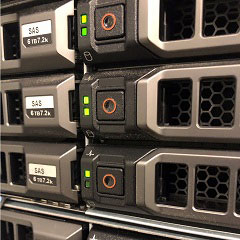April 20, 2018
Beocat adds Matlab compiler

The Beocat team has added the Matlab compiler and the most common toolboxes, including the parallel computing toolbox, optimization toolbox, statistics and machine learning toolbox, image processing toolbox, curve fitting toolbox, neural network toolbox, sumbolic math toolbox, global optimization toolbox and the bioinformatics toolbox. This is made possible through the CNAP Center of Biomedical Research Excellence, or COBRE.
This means that K-Staters will be able to develop MatLab code with Octave or elsewhere on a laptop or departmental server. Once a user is ready to do large runs, then they move the code to Beocat, compile the MatLab code into an executable, and submit as many jobs as needed to the scheduler. This does not include the graphical user interface capabilities.
Beocat has approximately 2.8PB of storage and about 7,800 processor cores on machines ranging from dual-processor Xeons with 64GB RAM to six 80-core Xeons with 1TB RAM, and is currently the largest HPC cluster in Kansas.
Beocat is the central computing resource for multiple departments across campus and is available to any academic researcher in Kansas and their partners under the statewide KanShare memorandum of understanding. Use of Beocat is free for professors and students in the state of Kansas. In addition to many users across the K-State campus, Beocat also is a resource for users from Wichita State University, Washburn University, Bethany College, Pittsburg State University, the University of Kansas and other institutions.
Beocat is supported by the National Science Foundation, National Institutes of Health, Department of Energy, Office of Research and Sponsored Programs and Information Technology Services.
For more information on its use or a tour, contact Daniel Andresen, director of the Institute for Computational Research in Engineering and Science, at dan@k-state.edu or at 785-532-7914.
